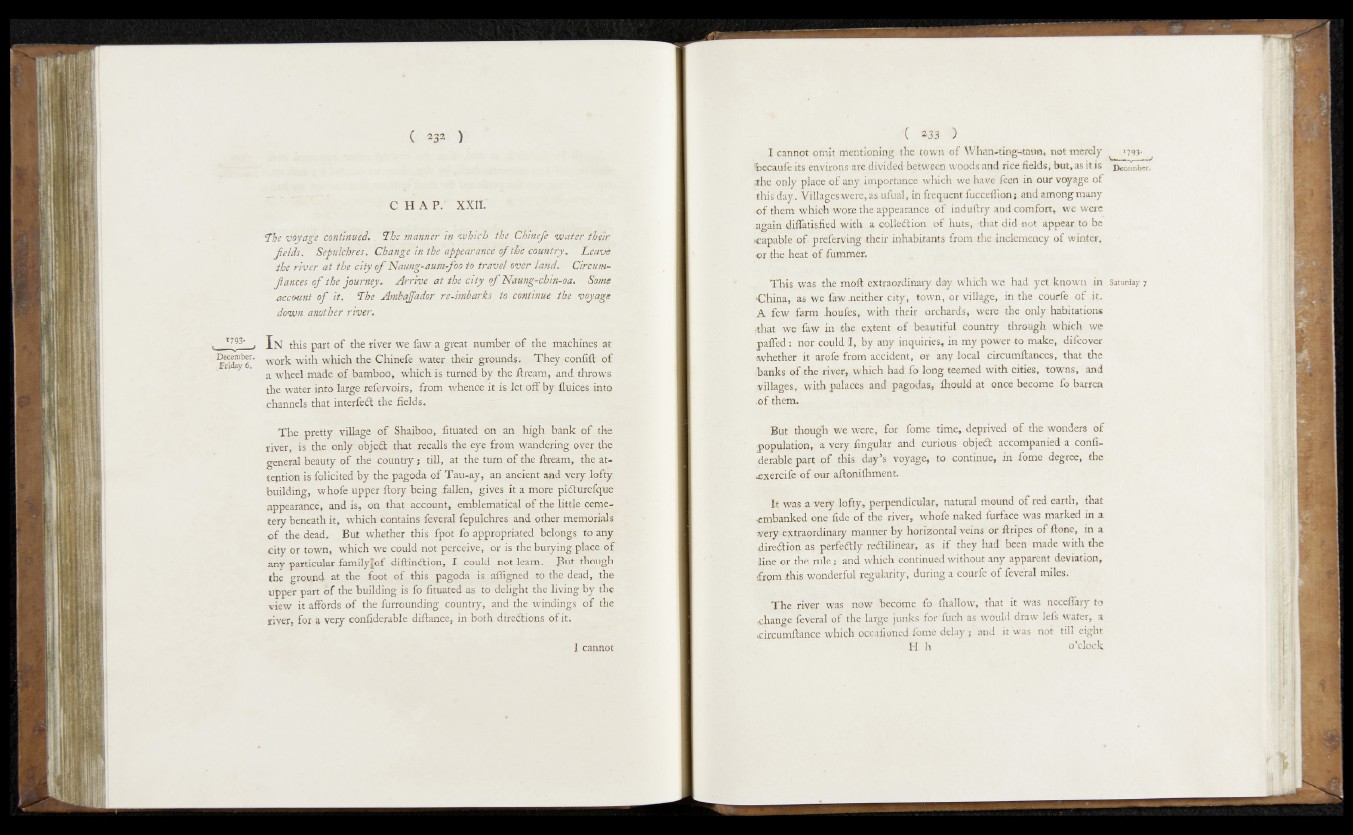
( m )
December.
.Friday 6.
C H A P.' xxn.
^Tie voyage continued. The manner in which the Chmeje wafer their
fields. Sepulchres. Change in the appearanceof the country. Leave
the river at the city o f' Naung-aum-foo to travel over land.- Circum-
fianfes o f the journey. Arrive at the city o f Naung-chin-oa. Some
account o f it. The Ambajfador re-imbarks to continue the voyage
down another river.
I n this part o f the river we faw a great number of the machines at
work with which the Chinefe water their, grounds. j-/They(cQnfift of
a wheel made .o f,bamboo, which is turned by, the flream, and thro.ws
the water into large refervoirs, from whence it is let off by fluices into
channels that interfed the fields.
The pretty village o f Shattrao, fituateA on Mr high bank of, the
river, is the only objed that recalls the eye from wandering over „the
general beauty o f the country/" till, at the turn o f the flream, .the attention
is fnliritcd by the pagoda o f Tau-ay, an ancient and \u y lofty
building, whofe upper ftory being fallen, gives it a more pidurefque
appearance, and is, on that account, emblematical of the little eeme-
tery beneath it, which contains feveral fepulchres and other memorial^
-of the dead. But whether this fpot fo appropriated belongs to any
city or town, which we could not perceive, or is the burying^place o f
any particular familyfof diftindion, I could notlearn. Jlutithough
the groipid at the foot of this pagoda -is .^ffigned tpilbfed'ead,- the
upper part o f the building is fo fitiiated as to delight the living by the
view it affords o f the furrounding country, and the windings' of the
river, for-a very eonfiderable diflance, in both diredions o f it, I
I cannot
I j j l I
I cannot omit mentioning the town of Whan-ting-taun, not merely ^ w
Jbecaufe its environs are divided between woods and rice fields, but.asitis December,
drhe only place of any importance which we have feen in our voyage of
this day,. Villages were, as ufual, in frequent fucceflionr and among many
of them which wore the appearance of induftr-y and comfort, we were
.again diffatisfied with a collection. of huts, that did-not appear to be
«capable .of preferying .their inhabitants from .the inclemency of winter,
e r fliehest of fummer.
^ This was .the moft extraordinary day which we had -yet known in Saturday j
China, as we faw neither city, town, or village, in the courfe of it.
A few farm hopfes, with their orchards, were die only habitations
jthat we'faw ip the extent of-beautiful country through which we
paffed : nor could J, by any inquiries, in my power to make, difcover
whether it arofe from accident, ©r any local circumftances, that the
banks of the river, which hud.fo long teemed with cities, towns, and
■villages, with palaces .and pagodas, fhould at once become fo barren
o f them.;
But though we w-ere, for fome rime, deprived ©f the wonders of
population, a yery fingular and curious objeCt accompanied a confi-
derable.part .of this day’s voyage, to contiwe, la fome degree, the
oxercife o f Out aftonifhment
'$t was sveiyflofty, perpepdicUiat, natural mound of red earth, that
«mbanked one f/de .of the river, whofe naked furface was marked in a
very extraordinary manner by horizontal veins or ftripes o f ftone, in a
riijreàioÿ^perfeaiy rectilinear, as ' i f they had been made with rire
line or tire ruler and wKicn' continued without any' apparent deviation,
from this wonderful regularity, during a courfe o f feveral miles.
The river was now become fo fhallow, that it was neceflary to
change feveral of the large junks for fuch as would draw lefs water, a
Circumftaft.ce which occafioned fomé delay/ and it was not till eight
H h 1 o’clock